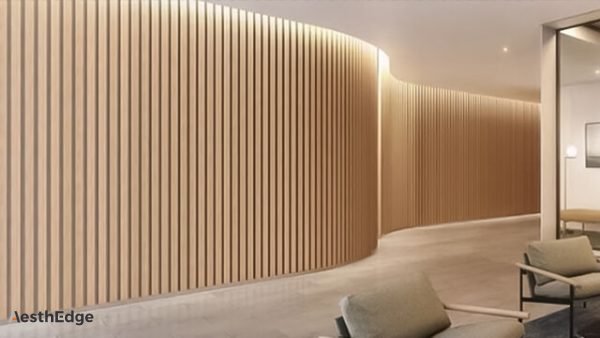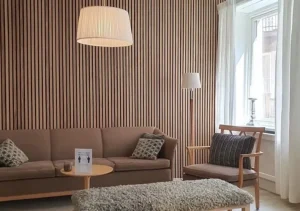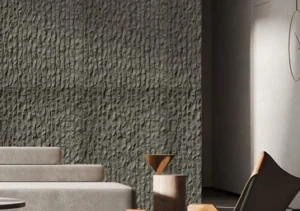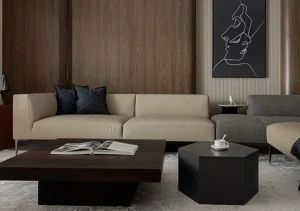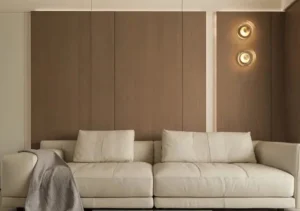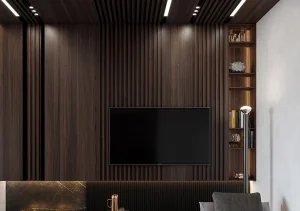Table of Contents
ToggleIntroduction: What Is Soft Porcelain and Why Is It Rising Worldwide?
In the past decade, global architectural design has shifted toward materials that offer greater flexibility, sustainability, and ease of installation. Among these materials, soft porcelain—also known as “flexible ceramic tile” or “flexible stone”—has become one of the most innovative surface decoration solutions for interior and exterior projects.
Soft porcelain is a new-generation flexible decorative material produced from natural stone powder, high-molecular polymers, and inorganic fillers. It visually resembles natural stone, marble, or ceramic tiles, but is much lighter, bendable, and easier to install, with excellent durability and weather resistance.
Its unique structure provides advantages that traditional porcelain tiles, solid wood panels, PVC sheets, and natural stone cannot match. Soft porcelain is particularly popular in Europe, the Middle East, Southeast Asia, and North America—across both commercial and residential building markets, especially for renovation projects where weight limits and installation difficulty matter.
This article explores the core advantages of soft porcelain, its technical characteristics, cost-effectiveness, and application value to help architects, contractors, designers, and international distributors understand why soft porcelain is becoming a preferred choice in modern decorative materials.
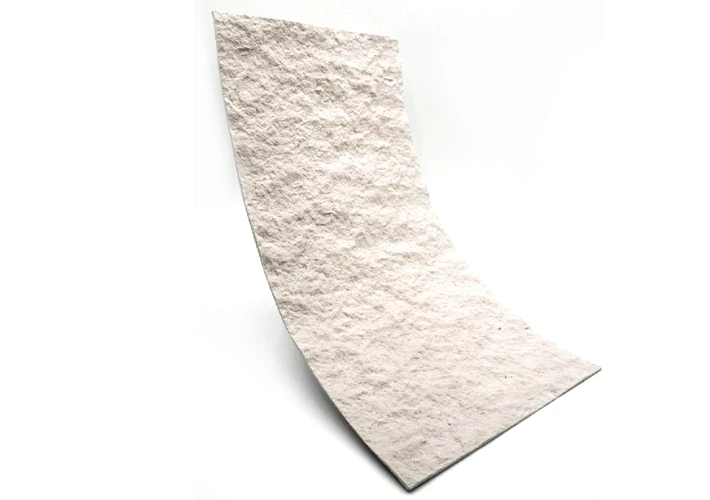
Lightweight Yet Highly Durable Construction Material
One of the major advantages of soft porcelain is its lightweight structure combined with outstanding durability.
1.Significantly Lighter Than Ceramic Tiles or Natural Stone
- Traditional ceramic tiles: 15–25 kg/m²
- Natural marble: 25–35 kg/m²
- Soft porcelain: 3–6 kg/m²
This enormous reduction in weight:
- Minimizes structural load on buildings
- Makes large-surface installation more manageable
- Reduces transportation costs by up to 60%
The lightweight nature also makes soft porcelain a reliable choice for old building renovation and high-rise exterior wall cladding, where weight restrictions are critical.
2.Strong Mechanical Properties
Soft porcelain achieves:
- Bending strength > 20 MPa
- Impact resistance far superior to ceramic tile
- Excellent dimensional stability
Because the material is flexible rather than brittle, it withstands deformation without cracking—ideal for curved walls, columns, irregular facades, and complex architectural geometry.
3.Longevity and long-term performance
Due to its hybrid structure of natural minerals and polymers, soft porcelain remains stable even under:
- UV radiation
- Temperature fluctuations
- Outdoor rain and wind exposure
Its service life often exceeds 15–30 years depending on the installation environment.
Flexibility and Bendability for Complex Architectural Surfaces
Flexibility is one of the most recognizable advantages of soft porcelain.
1.Can Bend Without Breaking
Soft porcelain can be bent to wrap around:
- Arched walls
- Exterior columns
- Curved building facades
- Wavy and artistic shapes
- Interior design elements
Traditional ceramic tiles cannot be used in these applications due to their brittle, rigid structure.
2.Ideal for Prefabricated and Modular Construction
Because soft porcelain can be cut with scissors or simple tools, it suits:
- Modular house interiors
- Prefab wall panels
- Lightweight building structures
- Fast renovation projects
Its flexibility also reduces installation errors and tile breakage, improving overall efficiency.
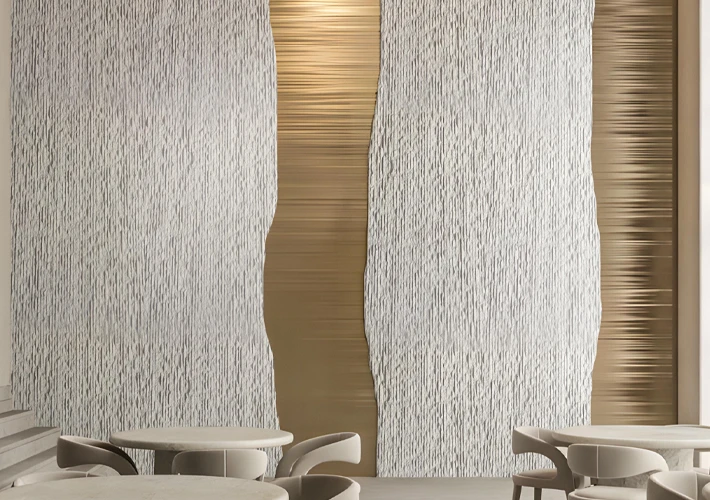
3.Excellent for Seamless Large-Surface Installation
Soft porcelain is commonly supplied in:
- 600×1200 mm
- 900×1800 mm
- Custom oversized formats
The material can be installed seamlessly or with micro-gaps, creating a large-surface continuous stone effect that traditional tiles rarely achieve.
Superior Safety Performance—Fireproof, Moisture-Proof, Anti-Crack, and Slip-Resistant
Safety is a top priority in modern building design, and soft porcelain excels in multiple safety-critical performance indicators.
1.Class A Fire Resistance
Soft porcelain is produced from:
- Inorganic mineral powder
- Natural stone particles
- High-temperature-resistant polymers
Therefore, it meets Class A fireproof standard, meaning:
- It does not burn
- It does not release toxic smoke
- It reduces fire spread risk
This makes it suitable for:
- Commercial buildings
- Public spaces
- Schools and hospitals
- Hotel corridors
- Metro stations
- High-rise exterior walls
2.Moisture-Proof & Water-Resistant
Because it contains non-organic minerals and polymer binders, soft porcelain:
- Does not absorb moisture
- Does not swell or deform
- Inhibits mold growth
Applications include:
- Bathrooms
- Kitchens
- Balconies
- Wet rooms
- Tropical or coastal climates
3.Anti-Crack and Anti-Freeze
Soft porcelain is stable in environments ranging from –30°C to 70°C, making it suitable for:
- Europe
- Canada
- Russia
- Cold regions that experience freeze–thaw cycles
4.Optional Anti-Slip Treatment
Through surface processing technology, soft porcelain can achieve:
- R9–R12 anti-slip levels
This is ideal for:
- Hotels
- Shopping malls
- Commercial lobbies
- Staircases
- Swimming pool surroundings
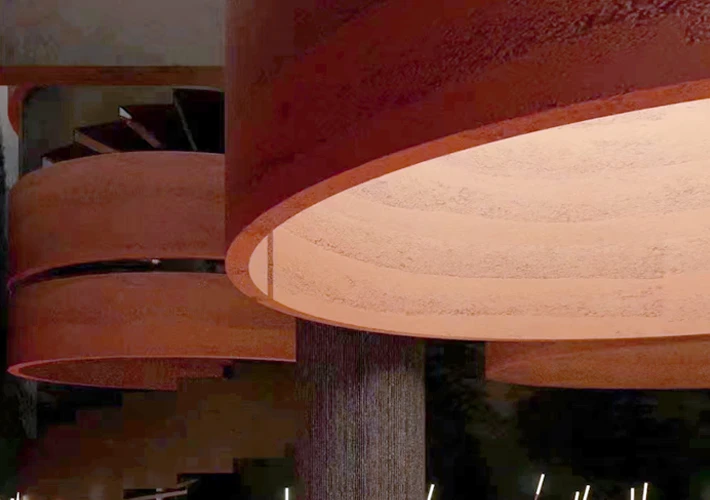
Easy Installation, Repair, and Maintenance—Perfect for Renovation Projects
Unlike ceramic tiles that require wet installation, soft porcelain supports both wet and dry installation, greatly reducing labor costs and installation time.
1.Simple Tools, No Professional Tile Cutter Required
Soft porcelain can be cut with:
- Utility knife
- Scissors
- Small cutting tools
This reduces:
- Tool costs
- Labor difficulty
- Damage rate
2.Fast Installation (3× Faster Than Ceramic Tiles)
Soft porcelain can be installed using:
- Special adhesive
- Industrial glue
- Double-sided construction tape (for some indoor uses)
Installers can complete:
- 200–300 m² per day (single team)
Compared to ceramic tiles, this is 2–3 times more efficient.
3.Perfect for Old-Building Renovation (“Tile-over-Tile”)
Soft porcelain supports direct surface overlay on:
- Old tiles
- Cement walls
- Wooden boards
- Glass and metal surfaces
No demolition required → less dust → lower labor costs → faster project completion.
This makes soft porcelain extremely attractive for:
- Hotels
- Office renovations
- Retail stores
- Apartment remodeling
- Commercial chain stores
4.Low Maintenance
Soft porcelain:
- Does not absorb stains
- Resists scratches
- Requires no waxing or sealing
- Can be cleaned with simple detergents
Long-term maintenance cost is almost zero.
Natural Stone Appearance + Unlimited Design Possibilities
One of the most attractive features of soft porcelain is its realistic stone-like appearance.
1.High-Definition Stone Texture
Using high-resolution digital printing, soft porcelain perfectly replicates:
- Marble
- Granite
- Travertine
- Slate
- Terrazzo
- Cement texture
- Wood grain
- Metal finish
The visual effect is close to natural stone, making it a cost-effective alternative.
2.Custom Colors, Patterns, and Surface Effects
Soft porcelain offers:
- Glossy finish
- Matte finish
- Soft-touch surface
- 3D texture
- Rustic/sandblasted effect
Factories can customize:
- Colors
- Sizes
- Logos
- Texture depth
This flexibility makes it suitable for branded commercial projects that require unique aesthetics.
3.Suitable for Luxury Projects
Soft porcelain is widely used in:
- Hotels
- High-end villas
- Shopping malls
- Corporate offices
- Real estate showrooms
Architects value its combination of lightweight, luxurious appearance, and flexibility.
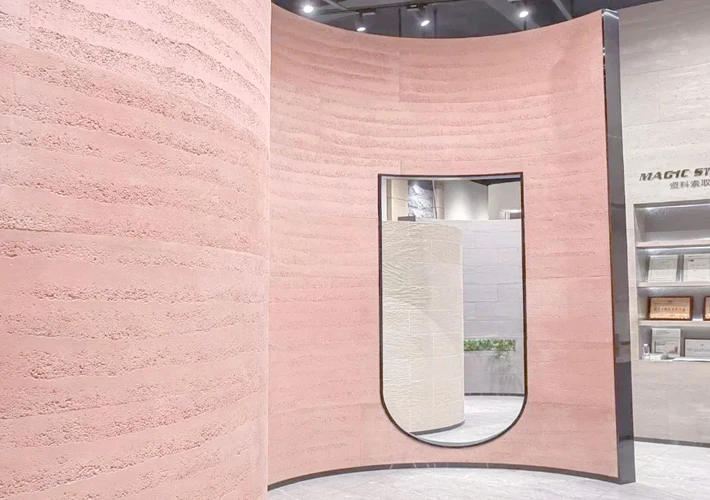
Cost-Effective Choice for Large Commercial Projects
Although soft porcelain appears premium and high-tech, it provides excellent cost advantages.
1.Lower Material Cost Compared to Natural Stone
Natural marble can cost:
$30–$100/m²
Soft porcelain typically costs:
$8–$20/m²
This makes it an ideal alternative for cost-controlled projects.
2.Reduced Transportation Costs
Because of its low weight, transport cost is:
30–60% cheaper
compared to ceramic tiles or stone.
3.Lower Installation Cost
Installation savings include:
- Shorter project duration
- Less professional labor
- No tile-breakage losses
- No structural reinforcement needed
Overall project cost savings are often 20–40%.
4.Long Service Life = Lower Long-Term Cost
Soft porcelain resists cracking, fading, and moisture damage, reducing maintenance costs significantly.
For commercial clients such as hotel chains or retail groups, the long-term budget advantage is substantial.
Typical Applications of Soft Porcelain (Bonus Section)
Soft porcelain can be used in almost all architectural surfaces, including:
Interior Applications
- Living room walls
- Bathroom and shower walls
- Kitchen backsplashes
- Bedroom background walls
- Hotel lobbies
- Office interiors
- Residential projects
- Commercial spaces
- Shopping malls
Exterior Applications
- Exterior building facades
- Old-building exterior renovation
- Curved architectural surfaces
- Commercial signage backgrounds
- Outdoor landscape walls
- Container houses / prefabricated houses
Special Applications
- Columns and curved walls
- Lightweight panels (SPC/WPC substrate surfaces)
- Modular buildings
- Exhibition halls
Its versatility is one of the major reasons for its global popularity.
Why Soft Porcelain Represents the Future of Decorative Materials
Soft porcelain is transforming the decorative materials market due to its combination of performance, design versatility, and installation convenience. Its advantages include:
- Lightweight and durable
- Flexible and bendable
- Fireproof, waterproof, and crack-resistant
- Easy and fast installation
- Suitable for curved surfaces
- Natural stone appearance with customizable style
- Cost-effective for large projects
- Excellent weather resistance for outdoor use
As global construction trends shift toward lightweight, sustainable, and efficient materials, soft porcelain is expected to continue expanding rapidly across both residential and commercial markets.
If you are an architect, distributor, contractor, or materials supplier, soft porcelain provides an excellent opportunity to expand your product portfolio and meet modern design demands.

